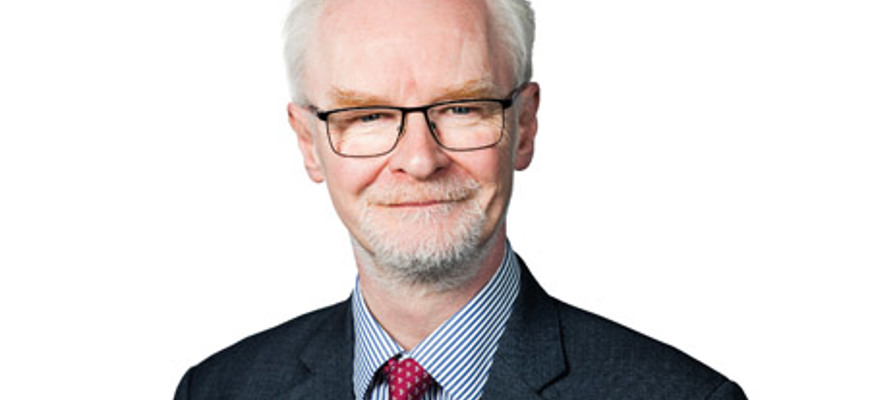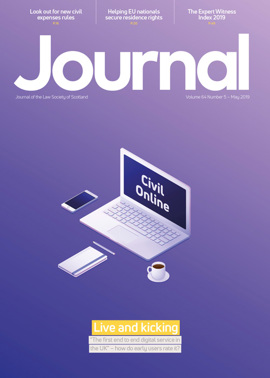Profile: Michael Clancy

1. What motivated you to study law?
When I was young I was taken to Parliament House by my parents and saw the courts and all the lawyers milling around. That made a big impression on me. My parents encouraged me to study at school and at Holy Cross High in Hamilton I had very supportive teachers.
I studied at Glasgow University during the late 1970s. The Faculty there, under the famous, productive and exacting Professor David Walker, was a diverse, interesting and inspiring group of educators. Each of them brought their own talent to their profession. People like Robert Sutherland WS, my adviser of studies, who taught mercantile law (l particularly remember his lectures on bills of exchange), or Professor Bill Gordon who taught civil (Roman) law, not only taught the topic in hand but also added deep thought and personal philosophy to that teaching.
This encouraged a sense of inquiry, almost a need to find out more, which drove me to continue studying after I finished my LLB.
I completed an LLM in 1985 from Glasgow and then an LLB in English law from the University of London in 1987.
Osvaldo Franchi, the senior partner in my firm and my apprentice master, used to say that getting qualifications was like “putting keys in your pocket”. Those keys have enabled me to unlock many problems over the years.
2. What attracted you to the Society?
I joined Franchi, Wright & Co as an apprentice in September 1979. The firm was a small one (when I started it had four partners and a couple of assistants), situated in Lion Chambers at 170 Hope Street, Glasgow (an interesting architectural gem — one of the first concrete buildings in Scotland). It was not just a law firm though — it also comprised the Italian Vice Consul for the West of Scotland, and we acted for many people in the Italo-Scozzese community as well as clients from across the UK and the then EEC. Accordingly we did a lot of private international law work and issues such as choice of law or jurisdiction were frequently discussed. As a balance we also did the court work both criminal and civil, conveyancing, trust, wills and private client material, and commercial business.
It was a good firm for an all round training and I stayed on after my apprenticeship finished. My leaning was to chamber work, but the size of the firm meant that everyone had to do the full range – specialisation was not yet as specialised as it would become in the 1990s. Every so often I would appear in court, but after two of the partners (one of whom did the majority of the conveyancing) died, I was asked if I would become the conveyancing partner. I had been taught well by the late James Docherty, but I was not sure that I wanted to be a partner. I had spent seven years with the firm and I was beginning to feel that I needed exposure to some different aspects of the law in action. I deferred accepting the partnership and saw a job advertised at the Society to organise legal conferences. I applied for the job, got an interview and was rejected.
The post-interview feedback indicated that the panel felt I had other skills to offer the Society. At that time, in 1986, the Deputy Secretary Law Reform, Debbie Adams was focused on preparing the rules which the Society had to put in place because of the implementation of the Financial Services Act 1986, and she needed some help. So I was invited to take on some law reform work on a part-time basis, including dealing with some EEC law (the draft directive on Commercial Agents) and some domestic law — the Review of Banking Law conducted by Professor Bobby Jack, a partner at McGrigor Donald in Glasgow.
I had to give up this part-time work to devote more time to the partnership, but in 1988 one of the deputy secretaries in the then Complaints department, Bill Hogg, was appointed as a judge at the industrial tribunal (the precursor of the employment tribunal). In addition, the Solicitors (Scotland) Act 1988, which gave the Society jurisdiction over inadequate professional services, was about to be implemented and the Society advertised for a person to take up a role dealing with the new law. I applied for the job and got it. Although I was emotional at leaving Franchi Wright & Co, I was excited to take on groundbreaking work at the Society. I arrived however just in time to witness (and participate in) what was to become the most significant reform in legal services since the creation of the Society in 1949.
3. Can you tell us about some of the highlights of your career?
There have been many highlights.
When I was in private practice the undoubted highlight was being able to help people with their legal problems. Since I have worked at the Society there have been many standout items.
One is certainly being involved in the passage of the Law Reform (Miscellaneous Provisions) (Scotland) Act 1990, which created solicitor advocates and tried (with marginal success) to reorganise the areas of work reserved to solicitors. It introduced me to parliamentary work.
A second is devolution and the creation of the Scottish Parliament. The Parliament has transformed law in Scotland in so many ways and the Society has often had significant influence on legislation such as adults with incapacity, the abolition of feudal tenure, many aspects of family law, criminal law and other areas besides. A third is the ongoing process of constitutional reform which, starting in 1997, is with us still today.
Lastly, the process of Brexit – whether one is for or against leaving the EU, the legal aspects of this monumental change are very significant. We are in an unparalleled period of law reform and policy development, and no matter what the outcome of the parliamentary process and high level negotiations, our parliamentary and constitutional system will never be the same again. I originally thought that Brexit was like the Reformation. But the struggle in the UK Parliament which we have witnessed recently is more reflective of the contest between Crown and Parliament in the 17th century. There are so many variables and moving parts that it would be foolish to make predictions as to the landing point or points, but the relationship between Government and Parliament, among political parties, between the UK Government and the devolved administrations, and indeed between the electors and those they elect, will undoubtedly undergo further change in the coming years.
Undoubtedly a major highlight has been to have great colleagues over the years. I have met and worked an amazing range of clever, dedicated people, co-workers, committee and Council members, solicitors and non-solicitors alike who undertake fantastic work for the benefit of both the public and the profession.
4. Looking back, what do you see as the most significant changes or milestones affecting the Scottish legal profession since you started out?
There are so many changes it is difficult to choose. The profession has grown considerably since I was admitted, from 4,000 or so to 12,000 solicitors, and yet the population of Scotland hasn’t tripled, so that means that solicitors today are doing more and more varied work (especially in litigation, commercial and international areas) than their predecessors. The use of technology has dramatically changed the way we work. Every firm in the 1980s had a telex address — Franchi Wright &Co’s was “Lexpert” — now the only place to find a telex machine is a museum! Advances in legal tech are changing the way many solicitors work, and those changes will increase and become more widespread in the future. Legal change will continue and the amount of law and its complexity will increase.
Developments in the law to meet social, economic and environmental changes will mean increased specialisation and more focused expertise — again the use of technology will assist solicitors of the future to serve their clients in ways which we today can only imagine. The rule of law and respect for human rights has been more acutely recognised over the past 20 years, mainly as a result of increasing awareness of judicial review and also because of the Human Rights Act 1998. The need to speak out in defence of human rights will, I feel, increase as those core values come under attack across the world — and vigilance will be essential at home as well.
5. What’s your top tip for new lawyers?
Follow the three principles of law made famous by the jurist Ulpian and quoted by Justinian: Live honestly, don’t hurt other people and give each person their due — or to put it another way, deal with everyone in the way you would like to be dealt with.
6. If you could ensure one change for the future of the Scottish legal profession, what would that be?
That the profession respects the rule of law and maintains its independence in the service of its clients and the public interest.
In this issue
- Claiming under the advance payment scheme
- Time for a written constitution
- New form F9: worth the wait?
- Wedded to a matrimonial property regime
- Brexit divorce set to increase UK's “skype families”
- Corporate personality: Justice v Doctrine
- Reading for pleasure
- The Law Society of Scotland Expert Witness Index 2019
- Opinion: Judith Robertson
- Book reviews
- Profile: Michael Clancy
- President's column
- Is your legal data being held to ransom?
- People on the move
- Sign up – log in – action!
- Frozen out?
- Taxing times for litigators
- DNA analysis: when research just isn’t enough
- Brexit focus: EU citizen settlement remedies
- Why employers should report on wellbeing
- 3% – and then what?
- 1,000 days of mediation
- Barred from acting
- To name or not to name?
- Enter the “What I Think”
- Fixed penalties and fair trials
- Auto-enrolment: keeping employers on their toes
- Scottish Solicitors' Discipline Tribunal
- Vulnerable accused: a need for knowledge
- Burdens and who can enforce them
- Convener’s final bow
- Public policy highlights
- TCSP review update
- Westminster: answering the call
- Accredited paralegal practice area highlight: family law
- Accredited Paralegal Committee profile
- Nyona named star paralegal
- Ask Ash
- Moving nightmares part 2
- Complaints: seeking consistent practice
- Morally bankrupt?
- For the elderly: how SFE works
- Standing up to challenge






